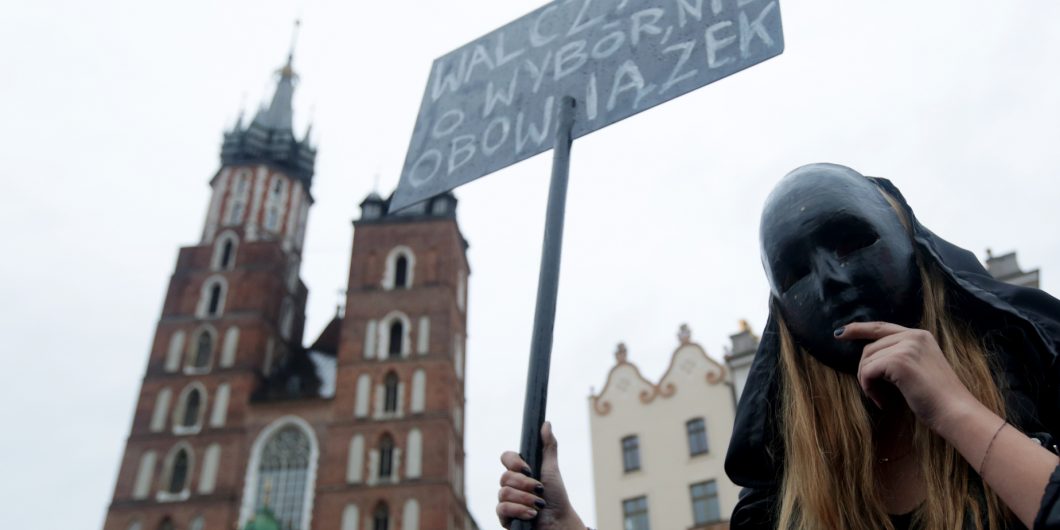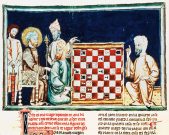Bad Faith in Broken Democracy
The authors of Faith, Nationalism, and the Future of Liberal Democracy are an example of the motto e pluribus unum: varied in identity, they are united in purpose. Two of them, David Elcott and C. Colt Anderson, are American—the former Jewish, the latter Catholic—teaching at NYU and Fordham respectively. The other two, Tobias Cremer and Volker Haarmann, are both German Lutherans; Cremer teaches at Oxford, Harrmann in the Rhineland. All four are men with a mission: to save their faiths from being co-opted by illiberal nationalists who are hell-bent on undermining liberal democracy.
For the historian of the 19th and 20th centuries, however, a certain irony is inherent in such a mission. Then and now, the nation state was the normal embodiment of liberal democracy. Liberals were often ambivalent about faith and sometimes about democracy, but nationalism was their main political platform. The aim might vary according to circumstance, from independence to unification or federalism, but no liberal movement could eschew the appeal of patriotic sentiment and national ideology. If religion was the opium of the people, nationalism was the religion of the intellectuals.
The present authors, however, see nationalism as a kind of opioid epidemic of the masses and faith, as interpreted by liberal theologians, as a possible remedy. Liberal democracy, they believe, is being threatened as never before, not by external forces such as Chinese Communism or Islamist terrorism, but by a nationalist assault from within. Western civilisation is not a phrase that would occur to any of these authors to use, but in so far as they do assume that the West still shares Judaeo-Christian values, they see the supreme test of those values in our response to the migration crisis in Europe and America. It is by rejecting any politics that treats refugees and other migrants as “the Other” that biblical faith proves its authenticity.
The Eastern and Central European Experience
This perspective—which would have been utterly alien even to the era of Reagan and Thatcher, let alone that of Roosevelt and Churchill—shows how radically the world has changed in little more than a generation since the end of the Cold War. In 1989, liberal democracy seemed to sweep all before it, an unstoppable tide that had overwhelmed all rivals. Among these rivals, “illiberal nationalism” would not have figured at all. John Paul II and the Polish Solidarity movement were seen as the essential vanguard of the peaceful revolutions that overthrew the Soviet empire. Solidarity’s Hungarian counterpart was Fidesz, led by the young Viktor Orbán. Yet today, the Polish Law and Justice Party—self-declared disciples of the Pope they now revere as St. John Paul the Great—and the Hungarian Government of Fidesz, still led by Orbán, are seen by Elcott et al. as anathema not only to liberalism and democracy but to Christianity and Judaism too.
Moreover, liberal democracy is no longer seen as invulnerable—the ultimate triumph in the terminal point of history. Now, liberal democracy is depicted as an embattled, indeed endangered, political project: its most fundamental principles are undermined by nationalists even in its English-speaking homelands. The end of history now is itself history, and some of the victors of the Cold War turn out to have had different aims than their Western European allies. In lands that had been on the front line of the Ottoman Empire for centuries, Islam was bound to be seen differently. In Central Europe, where borders had been moved many times over the years, refugees were a familiar sight; Muslim refugees, however, were not. They were unwelcome to many people, not merely on grounds of prejudice, but also of prudence: having observed the multicultural experiments conducted by their neighbours in Western Europe and North America, these culturally homogeneous nations were in no hurry to emulate them.
The authors profess to have combined to write a manifesto for a liberal fight-back to reclaim the Judaeo-Christian legacy from the clutches of religious reactionaries. But they are deceiving themselves.
Churches have, according to the authors, played their part in reinforcing resistance to Muslim immigration in Europe and America. In Poland, Marian feasts such as Our Lady of the Rosary have been turned into occasions for politicians to rally ethnocentric nationalism, with xenophobic or racist slogans such as “Pure Poland, White Poland.” Such attitudes were condemned by none other than John Paul II, who is quoted to the effect that Christians must “reject all nationalistic thinking.” Yet the collapse of the Soviet empire in Central and Eastern Europe might never have happened but for an intensely patriotic desire for freedom allied with Judaeo-Christian values that Marxism was never able to supplant. Some of these values, rooted in the Bible and in tradition, are difficult to reconcile with secular liberalism. Culture and history matter: a radical separation of church and state seems more natural to American and French liberals than to Polish or Italian conservatives, let alone Orthodox Christians in Russia or Orthodox Jews in Israel. Attempts by the European Union or other supranational agencies to impose a liberal creed of human rights on people of religious faith are doomed to be counterproductive.
So the nexus of faith, nationalism, and liberal democracy is actually a good deal more complex than the authors allow. It isn’t just a matter of sweeping away the reactionary remnants of an ancien régime based on freedom and democracy. For those who reject the progressive credo invoke exactly the same justifications—liberty of conscience and the will of the people.
Where Are the Conservatives?
In their epilogue, Elcott et al. proclaim their own readiness to engage: “The types of faith presented in this book mean to inspire us to move off the sidelines and into the centre of these efforts to combat those who weaponise religion to fuel populist nationalist movements.” Amen to that—but do they fulfill their promise? Do they, in other words, address the nationalism they oppose in its strongest, most coherent form?
Had they done so, one would have expected to read a rather different book. Such a counterblast would have set out the theories of the leading thinkers in the nationalist cause in order to refute them. Among the European names one might have expected to see cited would be the late Roger Scruton, whose defence of a traditional conservatism founded on Anglican theology and Hegelian metaphysics has found a global following. Another worthy antagonist would be the leading Israeli thinker Yoram Hazony, whose book The Virtue of Nationalism—an unapologetic defence of the sovereign nation state grounded in the Hebrew Bible—resonates with many conservatives on both sides of the Atlantic. The Polish philosopher and politician Ryszard Legutko has produced a series of books, most recently Why I Am Not a Liberal and The Cunning of Freedom: Saving the Self in an Age of False Idols, which set out to anchor the populist nationalism of the Law and Justice party in Catholic political theology. In Budapest, the former editor of National Review and other conservative periodicals, John O’Sullivan, has established a phalanx of writers and thinkers at his Danube Institute who make the case for Atlanticism as “democracy and patriotism.” The Institute and its journal, the Hungarian Review, are close to the Orbán government. So too was the late Norman Stone, the erratic yet brilliant Scottish historian. Stone died in Budapest two years ago, though not before producing his idiosyncratic Hungary: A Short History, which describes Viktor Orbán sympathetically as “perhaps the best-known European leader” (which might even be true).
All these European intellectuals have something original to say—yet not one of them is cited in Faith, Nationalism, and the Future of Liberal Democracy. Even more surprising is the absence of several American intellectuals who have supported Donald Trump’s brand of nationalism and, in at least one case, served in his administration. Michael Anton became notorious for his 2016 essay for the Claremont Review of Books “The Flight 93 Election,” later expanded into a book, After the 93 Election: The Vote That Saved America. He has since published a sequel on the 2020 election: The Stakes: America at the Point of No Return. As his titles suggest, Anton is an apocalyptic rather than a religious thinker, but he sees Trump as a “national-political” defender of the Constitution. His omission from Elcott et al.’s book is baffling. Nor is there any attempt to engage with other writers for the Claremont Review, such as Christopher Caldwell, Charles Murray, James Ceaser, Victor Davis Hanson, or Harvey Mansfield. Not all are properly described as nationalists, nor are they all Trump supporters. Despite having been severely critical of the former President, I have contributed to the quarterly myself. Yet any serious discussion of American conservative thought ought to mention at least some of the Claremont authors, among others. Yet not one member of this circle earns a place in Faith, Nationalism, and the Future of Liberal Democracy.
In short, this philippic against faith-based nationalism promises more than it delivers. They do a competent job of the prolegomena, explaining why it is important to persuade the churches and synagogues to throw their weight behind the defence of liberal democracy. But when it comes to the actual task of persuasion, these would-be scourges of the radical Right fall short.
Where is Islam?
There is something else missing from this book, too. Why is there no Muslim contributor and no chapter on Islam? Are European and American Muslims not yet European and American enough to count? Do they not qualify for the ritual of self-criticism that the authors feel is incumbent on Christianity and Judaism? Is the Islamic world really innocent of the illiberalism, populism, and nationalism for which the West must atone? If these impeccably liberal academics were serious about their concern for Muslims, would they not accord them the respect implied by treating their faith as equally deserving of scrutiny, rather than relegating Islam to the postcolonial status of a Third World phenomenon? Is this omission of a Muslim voice, which by definition cannot be accidental, not an example of the cardinal sin of “othering” them?
There is another point that flows from this failure to take Islam and Islamism seriously. Might the agitation against Muslim immigration in France, which admittedly is often driven by racism, also be based on genuine anxiety about terrorism and the failure of integration? One of the leaders of this agitation, the Right-wing journalist and putative presidential candidate Éric Zemmour, appeals to the French fear of becoming strangers in their own land. But Zemmour’s Jewish family, like thousands of others, was driven by Islamic regimes to migrate from North Africa to France. French Jews have been targeted by Islamist terrorists in recent years. Even if there is no real danger of Jews becoming refugees again, might their fear not be entirely authentic? So why does Elcott, in his “Jewish response to religious nationalism,” fail to consider the possible validity of that fear? By refusing to engage directly with the arguments of their foes, are they not guilty of “othering” the ordinary people who may be susceptible to those arguments?
What we have here, then, is a classic case of what Jean-Paul Sartre called mauvaise foi: “bad faith.” Professors Elcott, Anderson, Cremer, and Haarmann profess to have combined to write a manifesto for a liberal fight-back to reclaim the Judaeo-Christian legacy from the clutches of religious reactionaries. But they are deceiving themselves. They have not done the intellectual heavy lifting required to refute their opponents. Nor do they take Muslims seriously enough to consider whether they too might have some responsibility for their fate. So this volume will fail in its mission to galvanise resistance to nationalism. Indeed, it is an example of the very failing that it was written to address: “demonising opponents by ‘othering’ them.” Faith leaders will gain no traction with the faithful by ignoring their fears and belittling their feelings.



